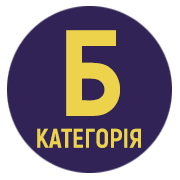WAYS OF DEVELOPING THE PROFESSIONAL INTEREST OF FUTURE ART TEACHERS
Abstract
The article examines the methodological features of the use of Poliskyi folklore as a factor in activating the professional interest of the future art (music) teacher. The content and structure of the concept of “professional interest” are substantiated. In particular, a definition has been proposed, according to which it is a selective personal focus of mental processes on the objects and phenomena of the surrounding world (according to G. Shchukina), which have professional significance for the individual and encourage him to master the profession. The authors consider the process of mastering the content of the profession (professional-cognitive component) to be the leading structural components of professional interest; the formation of a positive attitude to a certain type of activity, readiness to overcome the difficulties of professional formation (professional emotional and volitional component); practical activity related to mastering a profession (professional activity component). The main components of the professional interest of a music teacher are specified, in particular: understanding the essence, purpose, purpose of the profession; the presence of a persistent desire to engage in musical and pedagogical activities; ability to overcome professional difficulties; methodological inclusion of the future teacher in various types of professional musical activity. Using specific samples from the author’s practice of teaching the History of Music course, the authors demonstrate the developmental (regarding the professional interest of the music teacher) potential of the calendar-ritual folklore of the Rivne region. Perception, performance of individual folklore samples, analysis of stylistic means, identification of their pedagogical potential, modeling of fragments of art lessons, use of these models in the conditions of production practice, etc. are, according to the authors, effective ways of forming the professional interest of future teachers. When introducing examples of Poliskyi folklore into the “History of Music” course, it is necessary to focus on the structure of professional interest, taking care of the comprehensive development of its main components.
References
Дзвінка Р. (2008). Виховання майбутніх учителів засобами українського музичного фольклору. Рівне, Бердянськ: Овід. 254 с.
Красовська О. (2020). Технології викладання освітньої галузі «Мистецтво». Навчально-методичний посібник. Львів: Новий світ – 2000. 152 с.
Гончаренко С. (1992). Український педагогічний словник. Київ: Либідь. 366 с.
Щукина Г. (1979). Активізація пізнавальної діяльності учнів у навчальному процесі. М.: Просвещение. 160 с.
Савицька Т. Формування професійного інтересу в студентів підготовчого відділення закладів вищої медичної освіти. URL: http://repository.pdmu.edu.ua/bitstream/123456789/10079/1/Savitska_Formuvannia_profesiinoho_interesu.pdf.
Коберник О., Коберник Г. (1999). Активізація навчально-пізнавальної діяльності школярів. Рідна школа. № 12. С. 55–60.
Грица С. (2007). Українська фольклористика XIX – початку XX століття і музичний фольклор. Нарис. Київ. Тернопіль: Астон, 2007. 157 с.
Календарно-обрядові пісні Рівненщини (1994). Навчальний посібник з фольклору для загальноосвітньої школи. Упорядник В. Ковальчук. Рівне: Державно-редакційно-видавниче підприємство. 100 с.





